Canada men's national ice hockey team
The Canada men's national ice hockey team (popularly known as Team Canada; French: Équipe Canada) is the ice hockey team representing Canada internationally. The team is overseen by Hockey Canada, a member of the International Ice Hockey Federation. From 1920 until 1963, Canada's international representation was by senior amateur club teams. Canada's national men's team was founded in 1963 by Father David Bauer as a part of the Canadian Amateur Hockey Association, playing out of the University of British Columbia.[3] The nickname "Team Canada" was first used for the 1972 Summit Series and has been frequently used to refer to the Canadian national team ever since.
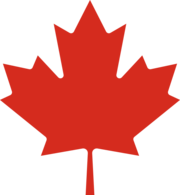 | |
| Nickname(s) | Team Canada (Équipe Canada) |
|---|---|
| Association | Hockey Canada |
| Head coach | Alain Vigneault |
| Assistants | Kirk Muller Lindy Ruff |
| Captain | Kyle Turris |
| Most games | Brad Schlegel (304) |
| Top scorer | Brad Schlegel |
| Most points | Cliff Ronning (156) |
| Team colours | Red, black, white[1] |
| IIHF code | CAN |
 | |
| Ranking | |
| Current IIHF | 1 |
| Highest IIHF | 1 (first in 2003) |
| Lowest IIHF | 5 (first in 2012) |
| First international | |
| Canada (Les Avants, Switzerland; January 10, 1910) | |
| Biggest win | |
| Canada (Stockholm, Sweden; February 12, 1949) | |
| Biggest defeat | |
| Soviet Union (Vienna, Austria; April 24, 1977) | |
| IIHF World Championships | |
| Appearances | 72 (first in 1920) |
| Best result | |
| World Cup / Canada Cup | |
| Appearances | 8 (first in 1976) |
| Best result | |
| Olympics | |
| Appearances | 22 (first in 1920) |
| Medals | |
Canada is the leading national ice hockey team in international play, winners of the 1972 Summit Series against the Soviet Union, four of five Canada Cups dating back to 1976, nine Olympic gold medals (the most in the world), including three of the last five: Salt Lake City 2002, Vancouver 2010, and Sochi 2014. They are 26-time IIHF World Champions and winner of the 2004 and 2016 World Cup of Hockey. Canada is a member of the so-called "Big Six", the unofficial group of the six strongest men's ice hockey nations, along with the Czech Republic, Finland, Russia, Sweden and the United States.[4]
History
Hockey is Canada's national winter sport, and Canadians are extremely passionate about the game. Canada was first represented internationally at the 1910 European Championships by the Oxford Canadians, a team of Canadians from the University of Oxford. They represented Canada again at the 1912 World Championships.
From 1920 until 1963, the senior amateur club teams representing Canada, were usually the most recent Allan Cup champions. The last amateur club team from Canada to win a gold medal at the World Championship was the Trail Smoke Eaters in 1961. The responsibility of choosing which team represented Canada belonged to Canadian Amateur Hockey Association secretary-manager; George Dudley from 1947 to 1960, and Gordon Juckes from 1960 to 1963.[5][6] Following the 1963 World Championships, Father David Bauer founded the national team as a permanent institution. The new permanent national team first competed at the 1964 Winter Olympics.
Before the Soviet Union began international competition in 1954, Canada dominated international hockey, winning six out of seven golds at the Olympics and 10 World Championship gold medals. Canada then went 50 years without winning the Winter Olympic Gold medal and from 1962 to 1993, didn't win any World Championships. This was in part because Canada's best professional players were unable to attend these events as they had commitments with their National Hockey League teams.
Canada withdrew from official IIHF events in 1970 and the National Team program was suspended after they were refused permission to use semi-professional players at the World Championship. Canada returned to the IIHF in 1977 after a series of negotiations between IIHF President Dr. Sabetzki and top officials of professional ice hockey in Canada and the United States. As a result, professionals are allowed to compete at the World Championship and the tournament is scheduled later in the year to ensure more players are available from among the NHL teams eliminated from the Stanley Cup playoffs. In return, a competition for the "Canada Cup" was to be played every four years on North American territory with the participation of Canada, the United States, and the four strongest European national teams, including professionals.
In 1983, Hockey Canada began the "Program of Excellence", whose purpose was to prepare a team for the Winter Olympics every four years. This new National Team played a full season together all over the world against both national and club teams, and often attracted top NHL prospects. In 1986, the International Olympic Committee voted to allow professional athletes to compete in Olympic Games, starting in 1988.[7] Veteran pros with NHL experience and, in a few cases, current NHLers who were holding out in contract disputes joined the team. This program was discontinued in 1998, when the NHL began shutting down to allow its players to compete.
After not winning a gold medal for 33 years, Canada won the 1994 World Championship in Italy. Since that time, they have won in 1997, 2003, 2004, 2007, 2015 and 2016. Canada captured its first Olympic gold medal in 50 years at Salt Lake City 2002. At Vancouver 2010, Canada won the gold medal with a 3–2 win against the United States in the final. Sidney Crosby's overtime goal secured Canada the final gold medal awarded at the Games.[8] At the 2012 World Championship in Finland and Sweden, Ryan Murray became the first draft eligible prospect to represent Canada at the Ice Hockey World Championship.
Canada successfully defended gold at Sochi 2014, becoming the first men's team to do so since the Soviet Union in 1988, the first to finish the tournament undefeated since 1984 and the first to do both with a full NHL participation. Their relentless offensive pressure and stifling defence has earned the 2014 squad praise as perhaps the best, most complete Team Canada ever assembled.[9] Drew Doughty and Shea Weber led the team in scoring, while Jonathan Toews scored the gold medal-winning goal in the first period of a 3–0 win over Sweden in the final. The architect behind the 2010 and 2014 teams, Steve Yzerman, immediately stepped down as general manager following the win.[10]
Led by general manager Jim Nill, head coach Todd McLellan, and the late addition of captain Sidney Crosby, Canada won the 2015 IIHF World Championship in dominating fashion over Russia, their first win at the Worlds since 2007. By winning all 10 of their games in regulation, Hockey Canada was awarded a 1 million Swiss franc bonus prize in the first year of its existence.[11] Canada scored 66 goals in their 10 games and had the top three scorers of the tournament: Jason Spezza, Jordan Eberle and Taylor Hall. Tyler Seguin also led the championship with nine goals. The win secured Canada's return to number one on the IIHF world rankings for the first time since 2010.[12]
List of teams representing Canada from 1920 to 1963
Competition achievements
Olympic Games
All Olympic ice hockey tournaments between 1920 and 1968 also counted as World Championships. They have won a total of 15 Olympic medals.[13]
World Championships
All Olympic ice hockey tournaments between 1920 and 1968 also counted as World Championships.[13] World Championships were not held during the Winter Olympic years of 1980, 1984 or 1988.[13]
| Year | Location | Result |
|---|---|---|
| 1920 | Antwerp, Belgium | Gold |
| 1924 | Chamonix, France | Gold |
| 1928 | St. Moritz, Switzerland | Gold |
| 1930 | Chamonix, France; Berlin, Germany; Vienna, Austria | Gold |
| 1931 | Krynica, Poland | Gold |
| 1932 | Lake Placid, US | Gold |
| 1933 | Prague, Czechoslovakia | Silver |
| 1934 | Milan, Italy | Gold |
| 1935 | Davos, Switzerland | Gold |
| 1936 | Garmisch-Partenkirchen, Germany | Silver |
| 1937 | London, Great Britain | Gold |
| 1938 | Prague, Czechoslovakia | Gold |
| 1939 | Zürich / Basel, Switzerland | Gold |
| World Championships not held from 1940 to 1946 during World War II. | ||
| Canada did not participate in 1947. | ||
| 1948 | St. Moritz, Switzerland | Gold |
| 1949 | Stockholm, Sweden | Silver |
| 1950 | London, Great Britain | Gold |
| 1951 | Paris, France | Gold |
| 1952 | Oslo, Norway | Gold |
| Canada did not participate in 1953. | ||
| 1954 | Stockholm, Sweden | Silver |
| 1955 | Krefeld / Dortmund / Cologne, West Germany | Gold |
| 1956 | Cortina d'Ampezzo, Italy | Bronze |
| Canada did not participate in 1957. | ||
| 1958 | Oslo, Norway | Gold |
| 1959 | Prague / Bratislava, Czechoslovakia | Gold |
| 1960 | Squaw Valley, US | Silver |
| 1961 | Geneva / Lausanne, Switzerland | Gold |
| 1962 | Colorado Springs / Denver, US | Silver |
| 1963 | Stockholm, Sweden | 4th place |
| 1964 | Innsbruck, Austria | 4th place |
| 1965 | Tampere, Finland | 4th place |
| 1966 | Ljubljana, Yugoslavia | Bronze |
| 1967 | Vienna, Austria | Bronze |
| 1968 | Grenoble, France | Bronze |
| 1969 | Stockholm, Sweden | 4th place |
| Canada did not participate in IIHF events from 1970 to 1976. | ||
| 1977 | Vienna, Austria | 4th place |
| 1978 | Prague, Czechoslovakia | Bronze |
| 1979 | Moscow, Soviet Union | 4th place |
| 1981 | Gothenburg / Stockholm, Sweden | 4th place |
| 1982 | Helsinki / Tampere, Finland | Bronze |
| 1983 | Düsseldorf / Dortmund / Munich, West Germany | Bronze |
| 1985 | Prague, Czechoslovakia | Silver |
| 1986 | Moscow, Soviet Union | Bronze |
| 1987 | Vienna, Austria | 4th place |
| 1989 | Stockholm / Södertälje, Sweden | Silver |
| 1990 | Bern / Fribourg, Switzerland | 4th place |
| 1991 | Turku / Helsinki / Tampere, Finland | Silver |
| 1992 | Prague / Bratislava, Czechoslovakia | 8th place |
| 1993 | Dortmund / Munich, Germany | 4th place |
| 1994 | Bolzano / Canazei / Milan, Italy | Gold |
| 1995 | Stockholm / Gävle, Sweden | Bronze |
| 1996 | Vienna, Austria | Silver |
| 1997 | Helsinki / Turku / Tampere, Finland | Gold |
| 1998 | Zürich / Basel, Switzerland | 6th place |
| 1999 | Oslo / Lillehammer / Hamar, Norway | 4th place |
| 2000 | Saint Petersburg, Russia | 4th place |
| 2001 | Cologne / Hanover / Nuremberg, Germany | 5th place |
| 2002 | Gothenburg / Karlstad / Jönköping, Sweden | 6th place |
| 2003 | Helsinki / Tampere / Turku, Finland | Gold |
| 2004 | Prague / Ostrava, Czech Republic | Gold |
| 2005 | Innsbruck / Vienna, Austria | Silver |
| 2006 | Riga, Latvia | 4th place |
| 2007 | Moscow / Mytishchi, Russia | Gold |
| 2008 | Quebec City / Halifax, Canada | Silver |
| 2009 | Bern / Kloten, Switzerland | Silver |
| 2010 | Cologne / Mannheim / Gelsenkirchen, Germany | 7th place |
| 2011 | Bratislava / Košice, Slovakia | 5th place |
| 2012 | Helsinki, Finland / Stockholm, Sweden | 5th place |
| 2013 | Stockholm, Sweden / Helsinki, Finland | 5th place |
| 2014 | Minsk, Belarus | 5th place |
| 2015 | Prague / Ostrava, Czech Republic | Gold |
| 2016 | Moscow / Saint Petersburg, Russia | Gold |
| 2017 | Cologne, Germany / Paris, France | Silver |
| 2018 | Copenhagen / Herning, Denmark | 4th place |
| 2019 | Bratislava / Košice, Slovakia | Silver |
| 2020 | Zürich / Lausanne, Switzerland | Cancelled[33] |
Spengler Cup
In the Spengler Cup, Team Canada competes against European club teams such as HC Davos who host the tournament every year in Vaillant Arena. Canada was initially represented by the standing national team at this event, but subsequently is usually made up of Canadians playing in European leagues or the American Hockey League. In 2019, Team Canada won its 16th Spengler Cups, passing the host team HC Davos (last win 2011) for the most titles.
| Results | Years |
|---|---|
| Winner | 1984, 1986, 1987, 1992, 1995, 1996, 1997, 1998, 2002, 2003, 2007, 2012, 2015, 2016, 2017, 2019 |
| Runners-up | 1985, 1988, 1990, 2000, 2001, 2005, 2006, 2008, 2010, 2018 |
| Third place | 1989, 1991, 1994, 1999, 2004, 2009 |
Team
Current roster
Roster for the 2019 IIHF World Championship.[34][35]
Head coach: Alain Vigneault
| No. | Pos. | Name | Height | Weight | Birthdate | Team |
|---|---|---|---|---|---|---|
| 4 | D | Dante Fabbro | 1.83 m (6 ft 0 in) | 86 kg (190 lb) | June 20, 1998 | |
| 5 | D | Philippe Myers | 1.96 m (6 ft 5 in) | 95 kg (209 lb) | 25 January 1997 | |
| 7 | F | Sean Couturier – A | 1.91 m (6 ft 3 in) | 96 kg (212 lb) | December 7, 1992 | |
| 10 | F | Tyson Jost | 1.80 m (5 ft 11 in) | 87 kg (192 lb) | March 14, 1998 | |
| 14 | F | Adam Henrique | 1.80 m (5 ft 11 in) | 91 kg (201 lb) | February 6, 1990 | |
| 16 | F | Jared McCann | 1.85 m (6 ft 1 in) | 84 kg (185 lb) | May 31, 1996 | |
| 17 | F | Dylan Strome | 1.90 m (6 ft 3 in) | 91 kg (201 lb) | March 7, 1997 | |
| 18 | F | Pierre-Luc Dubois | 1.91 m (6 ft 3 in) | 94 kg (207 lb) | June 24, 1998 | |
| 19 | F | Kyle Turris – C | 1.85 m (6 ft 1 in) | 86 kg (190 lb) | August 14, 1989 | |
| 21 | F | Mathieu Joseph | 1.85 m (6 ft 1 in) | 86 kg (190 lb) | February 9, 1997 | |
| 23 | F | Sam Reinhart | 1.85 m (6 ft 1 in) | 88 kg (194 lb) | November 6, 1995 | |
| 25 | D | Darnell Nurse | 1.93 m (6 ft 4 in) | 100 kg (220 lb) | February 4, 1995 | |
| 27 | D | Shea Theodore | 1.88 m (6 ft 2 in) | 88 kg (194 lb) | August 3, 1995 | |
| 28 | D | Damon Severson | 1.88 m (6 ft 2 in) | 93 kg (205 lb) | August 7, 1994 | |
| 29 | G | Mackenzie Blackwood | 1.93 m (6 ft 4 in) | 102 kg (225 lb) | December 9, 1996 | |
| 30 | G | Matt Murray | 1.93 m (6 ft 4 in) | 81 kg (179 lb) | May 25, 1994 | |
| 31 | G | Carter Hart | 1.83 m (6 ft 0 in) | 89 kg (196 lb) | August 13, 1998 | |
| 39 | F | Anthony Mantha | 1.96 m (6 ft 5 in) | 102 kg (225 lb) | September 16, 1994 | |
| 51 | D | Troy Stecher | 1.78 m (5 ft 10 in) | 84 kg (185 lb) | April 7, 1994 | |
| 59 | F | Tyler Bertuzzi | 1.83 m (6 ft 0 in) | 86 kg (190 lb) | February 24, 1995 | |
| 61 | F | Mark Stone – A | 1.93 m (6 ft 4 in) | 93 kg (205 lb) | May 13, 1992 | |
| 62 | D | Brandon Montour | 1.83 m (6 ft 0 in) | 88 kg (194 lb) | April 11, 1994 | |
| 71 | F | Anthony Cirelli | 1.83 m (6 ft 0 in) | 82 kg (181 lb) | July 15, 1997 | |
| 72 | D | Thomas Chabot | 1.88 m (6 ft 2 in) | 89 kg (196 lb) | January 30, 1997 | |
| 81 | F | Jonathan Marchessault | 1.75 m (5 ft 9 in) | 79 kg (174 lb) | December 27, 1990 |
Coaches
List of coaches of the Canada men's national ice hockey team.
- Olympics
- Gordon Sigurjonsson, 1920
- Frank Rankin, 1924
- Conn Smythe, 1928
- Jack Hughes, 1932
- Al Pudas, 1936
- Sgt. Frank Boucher, 1948
- Louis Holmes, 1952
- Bobby Bauer, 1956, 1960
- Father David Bauer, 1964
- Jackie McLeod, 1968
- Lorne Davis, Clare Drake, Tom Watt (co-coaches), 1980
- Dave King, 1984, 1988, 1992
- Tom Renney, 1994
- Marc Crawford, 1998
- Pat Quinn, 2002, 2006
- Mike Babcock, 2010, 2014
- Willie Desjardins, 2018
- Summit Series, Canada Cup, World Cup
- Harry Sinden, 1972 Summit Series
- Bill Harris, 1974 Summit Series
- Scotty Bowman, 1976, 1981 Canada Cups
- Glen Sather, 1984 Canada Cup
- Mike Keenan, 1987 and 1991 Canada Cups
- Glen Sather, 1996 World Cup
- Pat Quinn, 2004 World Cup
- Mike Babcock, 2016 World Cup
- World Championships
- Les Allen, 1930
- Blake Wilson, 1931
- Harold Ballard, 1933
- Johnny Walker, 1934
- Scotty Oliver, 1935
- John Achtzener, 1937
- Max Silverman, 1938
- Elmer Piper, 1939
- Max Silverman, 1949
- Jimmy Graham, 1950
- Dick Gray, 1951
- Greg Currie, 1954
- Grant Warwick, 1955
- Sid Smith, 1958
- Ike Hildebrand, 1959
- Lloyd Roubell, 1961, 1962
- Bobby Kromm, 1963
- Gord Simpson, 1965
- Jackie McLeod, 1966, 1967, 1969
- Johnny Wilson, 1977
- Harry Howell, 1978
- Marshall Johnston, 1979
- Don Cherry, 1981
- Red Berenson, 1982
- Dave King, 1983
- Doug Carpenter, 1985
- Pat Quinn, 1986
- Dave King, 1987, 1989, 1990, 1991, 1992
- Mike Keenan, 1993
- George Kingston, 1994
- Tom Renney, 1995, 1996
- Andy Murray, 1997, 1998
- Mike Johnston, 1999
- Tom Renney, 2000
- Wayne Fleming, 2001, 2002
- Andy Murray, 2003
- Mike Babcock, 2004
- Marc Habscheid, 2005, 2006
- Andy Murray, 2007
- Ken Hitchcock, 2008
- Lindy Ruff, 2009
- Craig MacTavish, 2010
- Ken Hitchcock, 2011
- Brent Sutter, 2012
- Lindy Ruff, 2013
- Dave Tippett, 2014
- Todd McLellan, 2015
- Bill Peters, 2016
- Jon Cooper, 2017
- Bill Peters, 2018
- Alain Vigneault, 2019
Uniform evolution
- National team jerseys
.png) 1994 Olympic jerseys
1994 Olympic jerseys 1998 Olympic jerseys, later used at IIHF tournaments 1998-2001
1998 Olympic jerseys, later used at IIHF tournaments 1998-2001 2008-2014, 2016 IIHF jerseys
2008-2014, 2016 IIHF jerseys 2014 Olympic jerseys
2014 Olympic jerseys Centennial IIHF jerseys 2015
Centennial IIHF jerseys 2015.png) 2016 WCH jerseys
2016 WCH jerseys 2017-present IIHF jerseys
2017-present IIHF jerseys.png) 2018 Olympic jerseys
2018 Olympic jerseys IIHF jerseys 2018
IIHF jerseys 2018
Notable jerseys
- Team Canada
 1928 Olympic jerseys
1928 Olympic jerseys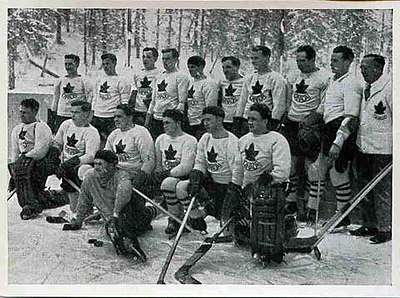 1936 Olympic jerseys
1936 Olympic jerseys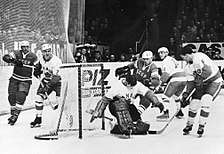 1964-1969 Olympic and IIHF jerseys
1964-1969 Olympic and IIHF jerseys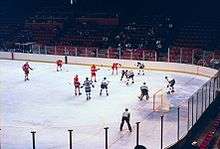 1980 Olympic jerseys
1980 Olympic jerseys 2002-2006 Olympic alternate jerseys
2002-2006 Olympic alternate jerseys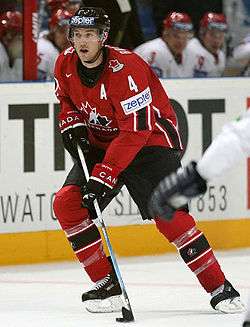 2007 IIHF jerseys
2007 IIHF jerseys- 2010 IIHF alternate jerseys
See also
References
- "Hockey Canada Logo Guidelines" (PDF). HockeyCanada.ca. Hockey Canada. March 27, 2013. Retrieved April 26, 2018.
- "IIHF Men's World Ranking". IIHF. April 24, 2020. Retrieved April 24, 2020.
- Hockey Canada
- "NHL announces World Cup of Hockey for 2016". The Canadian Press. January 24, 2015. Retrieved January 29, 2015.
- Young, Scott (1989). 100 Years of Dropping the Puck. Toronto, Ontario: McClelland & Stewart Inc. p. 218. ISBN 0-7710-9093-5.
- Oliver, Greg (2017). Father Bauer and the Great Experiment: The Genesis of Canadian Olympic Hockey. Toronto, Ontario: ECW Press. p. 32. ISBN 978-1-77041-249-1.
- Monsebraaten, Laurie (October 15, 1986). "Players in NHL are now eligible in the Olympics". Toronto Star.
- "Canada win thrilling final gold of Winter Olympics". BBC Sport. February 28, 2010. Retrieved March 1, 2010.
- "Sochi hockey squad one of the greatest Canada has ever iced". Toronto Sun. February 23, 2014. Retrieved February 24, 2014.
- "Steve Yzerman steps down as GM after Team Canada wins gold". Sports Illustrated. February 23, 2014. Retrieved February 24, 2014.
- "Will Canada hit jackpot?". IIHF. Retrieved May 16, 2015.
- "Canada wins first hockey worlds gold since 2007". ESPN. Retrieved May 19, 2015.
- Hockey Canada-IIHF World Men's championship
- Podnieks 1997, pp. 1–10
- Podnieks 1997, pp. 11–22
- Podnieks 1997, pp. 23–32
- Podnieks 1997, pp. 33–40
- Podnieks 1997, pp. 41–52
- Podnieks 1997, pp. 53–66
- Podnieks 1997, pp. 67–78
- Podnieks 1997, pp. 79–88
- Podnieks 1997, pp. 89–100
- Podnieks 1997, pp. 101–112
- Podnieks 1997, pp. 113–124
- Podnieks 1997, pp. 137–146
- Podnieks 1997, pp. 147–158
- Podnieks 1997, pp. 159–172
- Podnieks 1997, pp. 173–182
- Podnieks 1997, pp. 183–194
- Lapointe, Joe (February 1, 1998). "NAGANO '98; Wearing C, for Canada". The New York Times. Retrieved March 30, 2009.
- Wallechinsky 2002, p. 31
- Elliott, Helene (February 28, 2010). "Canada defeats U.S., 3–2, to win gold medal in men's hockey". Los Angeles Times. Retrieved March 1, 2010.
- Steiss, Adam. "2020 IIHF Ice Hockey World Championship cancelled". iihf.com. IIHF. Retrieved March 21, 2020.
- "Hockey Canada names 22 players to 2019 IIHF World Championship roster". hockeycanada.ca. April 29, 2019.
- "2019 IIHF World Championship roster" (PDF). Archived from the original (PDF) on May 17, 2019. Retrieved May 16, 2019.
- Podnieks, Andrew (1997). Canada's Olympic Hockey Teams: The Complete History, 1920–1998. Toronto: Doubleday Canada. ISBN 0-385-25688-4.CS1 maint: ref=harv (link)
- Wallechinsky, David (2002). The Complete Book of the Winter Olympics (2002 ed.). New York: The Overlook Press. ISBN 1-58567-185-1.CS1 maint: ref=harv (link)
- Meltzer, Bill NHL.com article on 2007 IIHF World Championship gold medal. Retrieved 2008-03-25.